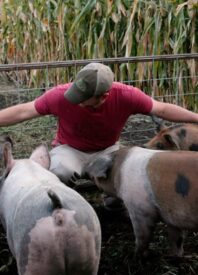
Food service workers and farmers are essential workers and, in a perfect world, the world will treat them as such. Food, Inc. 2 shows that North American capitalism ‘perfects’ and tweaks a lot of things except for compensating workers properly. People watching this movie aren’t brand new to this information, as it shows a food service worker having to calculate her expenses. It’s more shocking to see farmers having to get consultant jobs instead of having farming as their sole income source. Zack Smith from Winnebago County, Iowa inherited his land from generations of farmers like him. He has to follow the economic and political policy of limited farming even if he sees that policy’s impacts. He, like many people in the industry, are looking for solutions, and the movie shares his solutions-based thinking.
This movie’s directors are Robert Kenner and Melissa Robledo, picking up where they left off during the first instalment. They have a lot of ground to cover, and they eventually move on from workers rights to how corporations have more of a global reach. Coca Cola is advertising their products in Morocco while KFC has a hijabi biting off a chicken sandwich in Malaysia. Food, Inc. 2 also shows an ad of a Filipino family jamming during a Carnation ad. Pardon for reusing the phrase ‘brand new’ in this review, but the movie does make it seem like this is a recent phenomenon. I remember seeing ads like this in the Philippines as a boy. Nothing they’re showing is new, although most viewers agree that this global reach has consequences outside of dangerous consuming habits.
But as valid as that one big nitpick is against Food, Inc. 2, there are equally big elements here that make it a good film. The major positive thing here is that it approaches its topic without going into the doomsday scenarios that even ‘better’ documentaries indulge themselves with. Again, this movie focuses on solutions, which makes me return to that fast food worker who eventually joins a union. There’s also farmer Zach Smith. The movie starts out with him having to do single crop farming that was destroying his land. Several scenes later, he has a mobile barn that lets livestock produce soil. The movie does have a large scope but that other part of its approach makes viewers select what they can get out of it. I gravitate to the workers that the movie captures, who I like just as much as the filmmakers do.
- Rated: NR
- Genre: Documentary
- Release Date: 4/19/2026
- Directed by: Melissa Robledo, Robert Kenner
- Produced by: Eric Schlosser, Melissa Robledo, Michael Pollan, Robert Kenner
- Studio: Participant, River Road Entertainment

